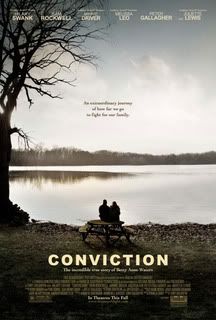← Back to Reviews
in
Day 193: November 9th, 2010
Conviction

Not powerful enough.
The true story of Betty Anne Waters, a working mother who puts herself through law school to represent her brother Ken Water, who has been wrongfully convicted of murder.
At one point in the film, her two sons ask each other if they would do the same for each other what their mother is doing for her brother. The one kid says something along the lines of "You'd throw your whole life away for me?" That's a pretty fair question, since Betty Anne's journey was 18 years. From 1983 to 2001 her main goal was to free her brother, this took a toll on her marriage and her kids. The question I walked away from this film was, could I do that? I have trouble sticking to a health routine, could I really spend 18 years with one clear goal in my mind, something that isn't going to be 100 percent certain?
At points during the film I was moved, mainly the performances from Swank, the always reliable Rockwell and surprisingly Juliette Lewis who steals the scene she is in. The performance from Rockwell further proves to me how underrated and under-appreciated he is in the industry. Swank gives her usual dedication to the role, both throw on accents that apparently aren't really true to form, so I hear. The whole movie feels like an award winning piece, but there are some issues with it that actually make it feel like a wannabe award winning piece.
The film weaves in and out of different time periods for the most part in the first half. It's distracting and doesn't fully give the audience the full weight of Betty Anne's journey. We start off with them as adults, Kenny already convicted, then we shoot back to when they are kids, then we go to before he is convicted, then back to kids, then to convicted, then back to kids, so on. I felt that the film seemed a bit rushed with the journey she takes and I did not fully feel the emotional weight of her undertaking. This was the key part of the film that they needed to hit and I think they missed it.
The film loses points from me due to the fact that the filmmakers chose to ignore some bits of facts regarding the ending because the test audiences found it too depressing. Yes, we know she gets him out because that's part of the story. DNA evidence was was used to exonerate him. The film ends with him out of prison and then some title cards appear to let us know where the actual people are now and what happened afterwards. They choose to ignore the fact that Kenny, 6 months after getting released, died. To me, that puts a whole new perspective on the matter and was a piece of information I think the film needed to give the audience.
Conviction

Not powerful enough.
The true story of Betty Anne Waters, a working mother who puts herself through law school to represent her brother Ken Water, who has been wrongfully convicted of murder.
At one point in the film, her two sons ask each other if they would do the same for each other what their mother is doing for her brother. The one kid says something along the lines of "You'd throw your whole life away for me?" That's a pretty fair question, since Betty Anne's journey was 18 years. From 1983 to 2001 her main goal was to free her brother, this took a toll on her marriage and her kids. The question I walked away from this film was, could I do that? I have trouble sticking to a health routine, could I really spend 18 years with one clear goal in my mind, something that isn't going to be 100 percent certain?
At points during the film I was moved, mainly the performances from Swank, the always reliable Rockwell and surprisingly Juliette Lewis who steals the scene she is in. The performance from Rockwell further proves to me how underrated and under-appreciated he is in the industry. Swank gives her usual dedication to the role, both throw on accents that apparently aren't really true to form, so I hear. The whole movie feels like an award winning piece, but there are some issues with it that actually make it feel like a wannabe award winning piece.
The film weaves in and out of different time periods for the most part in the first half. It's distracting and doesn't fully give the audience the full weight of Betty Anne's journey. We start off with them as adults, Kenny already convicted, then we shoot back to when they are kids, then we go to before he is convicted, then back to kids, then to convicted, then back to kids, so on. I felt that the film seemed a bit rushed with the journey she takes and I did not fully feel the emotional weight of her undertaking. This was the key part of the film that they needed to hit and I think they missed it.
The film loses points from me due to the fact that the filmmakers chose to ignore some bits of facts regarding the ending because the test audiences found it too depressing. Yes, we know she gets him out because that's part of the story. DNA evidence was was used to exonerate him. The film ends with him out of prison and then some title cards appear to let us know where the actual people are now and what happened afterwards. They choose to ignore the fact that Kenny, 6 months after getting released, died. To me, that puts a whole new perspective on the matter and was a piece of information I think the film needed to give the audience.
